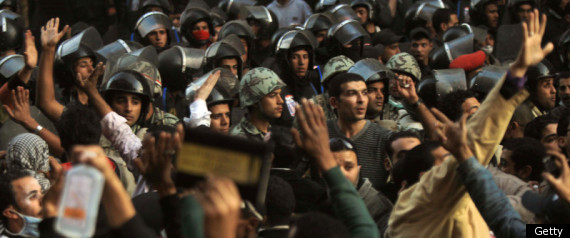Egypt’s military vowed to defend the country’s people against any “terrorist, radical or fool” as it is just hours ahead of its deadline for President Mohammed Morsi to resolve the nation’s political crisis – or face intervention by the Egyptian military army. A post on the official Facebook page of the Supreme Council of the Armed Forces, which is headed by Gen. Abdel-Fattah el-Sissi, read:
We swear to God that we will sacrifice even our blood for Egypt and its people, to defend them against any terrorist, radical or fool.
A military source told Reuters that the statement — issued after Morsi appeared on television late Tuesday to once again reject an ultimatum from Sissi that he share power with opponents or face military action by 10 a.m. ET — reiterates that the armed forces would not abandon their demands.
In an emotional 46 – minute speech, Morsi vowed not to step down and pledged to defend his legitimacy with his life in the face of three days of massive street demonstrations calling for his ouster. The Islamist leader, as he has from the beginning, accused loyalists of his ousted autocratic predecessor Hosni Mubarak of exploiting the wave of protests to topple his regime and thwart democracy.
“There is no substitute for legitimacy,” Morsi responded, at times raising his voice in clear anger, thrusting his fist in the air and pounding the podium. He warned that electoral and constitutional legitimacy “is the only guarantee against violence.”
The comments demonstrate that Morsi and the Muslim Brotherhood are prepared to challenge the army. It also entrenches the lines of confrontation between his Islamist supporters and Egyptians angry over what they see as his efforts to impose control through the Brotherhood and his failures to deal with the country’s multiple problems.
The looming showdown follows a night of deadly clashes in Cairo and among other locations in the country that left at least 23 people dead, the majority in a single incident near the main Cairo University campus. The latest deaths take to 39 the number of people killed since Sunday in violence between opponents and supporters of Morsi, who took office in June last year as Egypt’s first freely elected leader.
The bloodshed, coupled with Morsi’s defiant speech, contributed the sentiment that both sides are ready to fight to the end.
Meanwhile, a Defense Ministry official said Wednesday el-Sissi was holding an emergency meeting with his top commanders. The AP reported that the official, who gave no further details, spoke Wednesday on condition of anonymity because he was not authorized to brief the media.
Khaled Daoud, spokesman of the main opposition National Salvation Front, which pro-reform leader Mohamed ElBaradei leads, also said that el-Sissi was meeting with ElBaradei, Sheik Ahmed el-Tayeb, grand imam of Al-Azhar mosque, and Pope Tawadros II, patriarch of Egypt’s Coptic Christian minority, to discuss a political road map for Egypt.
Millions have taken to the streets since Sunday to call on Morsi to step down.

As anti- and pro-Morsi supporters ramped up for the fourth consecutive day of mass rallies Wednesday, it was clear that Egypt’s crisis has become a struggle over whether a popular uprising can overturn the verdict of the ballot box.
Mahmoud Badr, spokesman for the youth movement behind the latest wave of protests, called on anti-Morsi protesters to demonstrate outside three presidential palaces as well as the Cairo headquarters of the Republican Guard, an army branch tasked with protecting the president, his family and presidential palaces. Morsi is thought to have been working at the Republican Guard headquarters since the start of the protests.
Badr also called on the army to place Morsi under arrest for his alleged incitement to civil war.
“Today is the day of decisiveness,” Badr said at a news conference Wednesday.
According to Reuters, Morsi said Tuesday he would pursue his own plans for reconciliation between his government and opposition leaders.
On Tuesday, millions of jubilant, chanting Morsi opponents once again filled Cairo’s historic Tahrir Square, as well as avenues adjacent to two presidential palaces in the capital, and main squares in cities nationwide. After Morsi’s speech, they exploded in indignation, banging metal fences, and some raising their shoes in the air in a show of contempt. “Leave, leave,” they chanted.
Morsi’s supporters also moved out in increased marches in Cairo and other cities, and stepped up warnings that it will take bloodshed to topple him. While Morsi has stuck to a stance that he is defending democracy in Egypt, many of his Islamist backers have presented the fight as one to protect Islam.
On Monday, the military gave Morsi an ultimatum to meet the protesters’ demands within 48 hours. If not, the generals’ plan would suspend the Islamist-backed constitution, dissolve the Islamist-dominated legislature and set up an interim administration headed by the country’s chief justice, claimed the state news agency.
The leaking of the military’s political “road map” appeared aimed at adding pressure on Morsi by showing the public and the international community that the military has a plan that does not involve a coup.
Fearing that Washington’s most important Arab ally would descend into chaos, one that has been the benefactor of significant military weapons systems and arms, U.S. officials said they are urging Morsi to take immediate steps to address opposition grievances, telling the protesters they should remain peaceful – which they are not – and reminding the army that a coup could have consequences for the massive American military aid package it receives. U.S. law demands that arms transfer are to be halted in the event the regime is destabilized.

The army has insisted it has no intention to take power, as was the case in 2010. However, the road map showed it was ready to replace Morsi and make a sweeping change in the ramshackle political structure that has evolved since Mubarak’s fall in February 2011.
The constitution and domination of the legislature after elections held in late 2011 – early 2012, are two of the Islamists’ and Brotherhood’s most valued victories – along with Morsi’s election last year. Morsi is also facing new internal cracks within his leadership.
Three government spokesmen — two for Morsi and one for the prime minister — resigned on Tuesday as part of high-level defections that underscored Morsi’s increasing isolation and fallout from the military’s ultimatum. Five Cabinet ministers, including the foreign minister, resigned Monday, and a sixth, Sports Minister El-Amry Farouq, quit Tuesday.
One ultraconservative Salafi party, al-Nour, also announced its backing for early elections. The party was once an ally of Morsi but in recent months has broken away from him.
In a consequential decision, opposition parties and the youth movement behind the demonstrations agreed that reform leader and Nobel Peace laureate Mohamed ElBaradei would represent them in any negotiations on the country’s political future. The move appeared aimed at presenting a unified voice in a post-Morsi system, given the widespread criticism that the opposition has been too fragmented to present an alternative to the Islamists.







